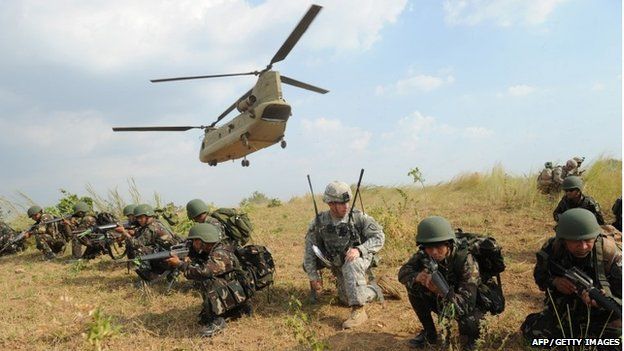Ashton Carter: US will play 'pivotal' role in Asia
- Published

The US takes part in an exercise with Philippine soldiers in April - the States says that "nothing" would stop its operations
US Defence Secretary Ashton Carter has said the US will continue to play a "pivotal" role in Asia in the future.
In an exclusive interview in Vietnam, Mr Carter told the BBC the US could ensure "peace and prosperity", the only way "everyone gets to rise and win".
He spoke amid new tensions over multi-nation claims in the South China Sea.
The US has accused China of creating land that could be used as airstrips in the Spratly Islands. Beijing denies it is asserting itself militarily.
Mr Carter said the US was not looking to militarise the situation, but that "nothing" would stop its operations.
Earlier this month, China criticised Washington after a US spy plane flew over areas near the Spratly Islands.
"Nothing will stop US military operations at all," said Mr Carter. "We will fly, we will sail, we will operate here in the Pacific as we always have."
He added: "We're not looking to militarise the situation or escalate the situation.
"We will continue to do what we have done for seven decades since World War Two ended - by being the pivotal military power in the region, which we are and will continue to be."
The US says China has added 2,000 acres in five areas of the Spratly Islands, and recently installed - then removed - artillery on the Spratlys.
Other issues covered in Mr Carter's BBC interview include:
Iraq: "The strategy makes perfect sense. The execution of the strategy is challenging. [Iraqi] PM [Haider] al-Abadi is trying to do all the right things, but is trying to hold together a country in which there are Sunnis, Shias and Kurds. On the military side, I've asked my staff to look at what we can do to increase the enabling of Iraqi forces. The key is that we can defeat Isil [Islamic State], but we can't keep them defeated. Only the people who live in the region can do that"
Ukraine and the possibility of a summer offensive: "We are looking at Russian activities, at the activities of separatists. It's a serious possibility and a serious danger"
UK defence spending: Mr Carter said he feared reductions in the UK's defence spending could result in the UK becoming "disengaged"
Satellite imagery showed China building an airstrip in the Spratlys
China's plans
Last week, China said it would focus on projecting its military presence beyond its borders at sea.
The defence planning document urges the Chinese navy to shift its focus to "open seas protection", rather than "offshore waters defence" alone.
In recent years, China has focused on building up its navy. It has launched an aircraft carrier and invested heavily in submarines and other warships.
On Sunday, China rebuffed some of Mr Carter's criticism on China's land reclamation projects, which he had described as "out of step" with international rules.
The Deputy Chief of the General Staff of the Chinese armed forces, Adm Sun Jianguo, said that China's rights and interests there were "indisputable" but that it was exercising them "with enormous restraint".
He said China's island-building was about helping the region and improving the living conditions of personnel stationed there.
"There is no reason for people to play up this issue in the South China Sea," he added.
Ashton Carter said the US was not looking to militarise the situation in Asia, but that "nothing" would stop its operations in the region
Shangri-La Dialogue: Big powers jostle
Top officials from Singapore, the UK and EU repeat US calls for China and the Association of Southeast Asian Nations (Asean) to adopt a code of conduct in the disputed waters
The US and Australia say they will continue to patrol what they consider to be international navigation zones in the South China Sea in spite of Chinese protests at "provocative moves"
China says it will base a decision to create an Air Defence Identification Zone (ADIZ) - which requires overflying aircraft to identify themselves - in disputed waters on its assessment of the security situation.
- Published30 May 2015
- Published29 May 2015
- Published7 July 2023